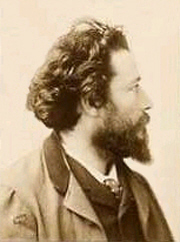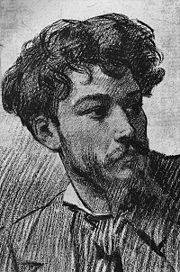
Jean Aicard
Encyclopedia


France
The French Republic , The French Republic , The French Republic , (commonly known as France , is a unitary semi-presidential republic in Western Europe with several overseas territories and islands located on other continents and in the Indian, Pacific, and Atlantic oceans. Metropolitan France...
poet
Poet
A poet is a person who writes poetry. A poet's work can be literal, meaning that his work is derived from a specific event, or metaphorical, meaning that his work can take on many meanings and forms. Poets have existed since antiquity, in nearly all languages, and have produced works that vary...
, dramatist and novelist.
Biography
He was born in ToulonToulon
Toulon is a town in southern France and a large military harbor on the Mediterranean coast, with a major French naval base. Located in the Provence-Alpes-Côte-d'Azur region, Toulon is the capital of the Var department in the former province of Provence....
. His father, Jean Aicard, was a journalist of some distinction, and the son early began his career in 1867 with Les Jeunes Croyances, followed in 1870 by a one-act play produced at the Marseille
Marseille
Marseille , known in antiquity as Massalia , is the second largest city in France, after Paris, with a population of 852,395 within its administrative limits on a land area of . The urban area of Marseille extends beyond the city limits with a population of over 1,420,000 on an area of...
theatre.
His poems include: Les Rebellions et les apaisements (1871); Poèmes de Provence (1874), and La Chanson de l'enfant (1876), both of which were crowned by the Academy; Miette et Noré (1880), a Provençal idyll; Le Livre d'heures de l'amour (1887); Jésus (1896). Of his plays the most successful was Le Père Lebonnard (1890), which was originally produced at the Théâtre Libre
Théâtre Libre
The Théâtre Libre was a theatre company that operated from 1887 to 1896 in the Montmartre district of Paris, France.-History:Théâtre Libre was founded on 30 March 1887 by André Antoine, who wanted to create a dramatization of an Émile Zola novel, Thérèse Raquin after the theater group for which he...
. Among his other works are the novels, Le Roi de Camargue (1890), L'Ame d'un enfant (1898) and Tata (1901), Benjamine (1906) and La Vénus de Milo (1874); an account of the discovery of the statue
Venus de Milo
Aphrodite of Milos , better known as the Venus de Milo, is an ancient Greek statue and one of the most famous works of ancient Greek sculpture. Created at some time between 130 and 100 BC, it is believed to depict Aphrodite the Greek goddess of love and beauty. It is a marble sculpture, slightly...
from unpublished documents.
He was elected a member of the Académie française
Académie française
L'Académie française , also called the French Academy, is the pre-eminent French learned body on matters pertaining to the French language. The Académie was officially established in 1635 by Cardinal Richelieu, the chief minister to King Louis XIII. Suppressed in 1793 during the French Revolution,...
in 1909.
Selected works
Poetry- Les Rebellions et les apaisements (1871)
- Les Poèmes de Provence (1874)
- La Chanson des enfants (1876)
- Miette et Note (1880)
- Le Livre d'heures de l'amour (1887)
- Jésus (1896))
Novels
- La Vénus de Milo (1874)
- Le Roi de Camargue (1890)
- Notre-Dame-d'Amour (1896), online at: http://www.gutenberg.org/etext/18627
- L'Âme d'un enfant (1898)
- Tatas (1901)
- Benjamine (1906)
- Maurin des Maures (1908)
- L'illustre Maurin (1908)
Dramatic works for stage
- Pygmalion (1878)
- Othello ou le More de Venise (1881)
- Le Père Lebonnard (1889)

